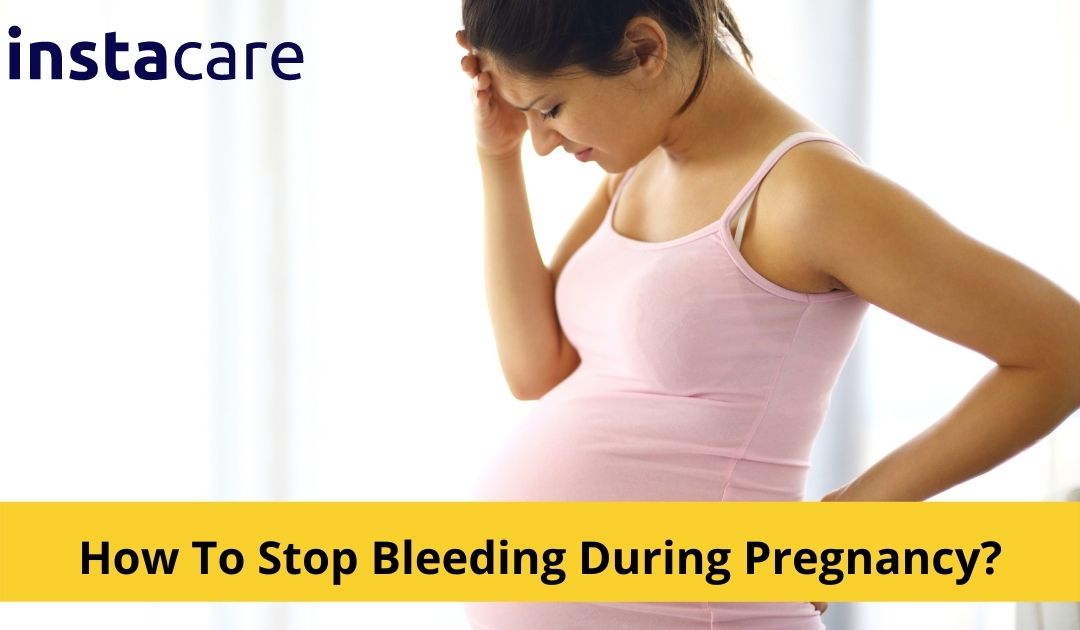Vaginal bleeding can be frightening during pregnancy. It isn't necessarily an indication of a problem, though. Bleeding is common in the first weeks of pregnancy, and most women who have bleeding during pregnancy birth to healthy babies.
Even so, vaginal bleeding should be handled seriously throughout pregnancy. Bleeding during pregnancy can signal an early miscarriage or a medical problem that requires immediate attention. You'll know what to look for and when to call your doctor if you know the most likely causes of vaginal bleeding during pregnancy.
What’s The Difference Between Bleeding And Spotting?
From conception until delivery, bleeding or spotting can happen during pregnancy. It happens when you get a few drops of blood on your panties. Blood spots are so light that they wouldn't even cover a panty liner. When your blood flow is heavy sufficient that you need a pad to stop the blood from staining your underwear and clothes, you're bleeding.
What Causes Bleeding Or Spotting In Pregnancy?
Some spotting of blood is normal early in pregnancy. In the first phase, bleeding or spotting is not an issue. It can be brought on by:
- Having sex
- Implantation. When a fertilized egg (embryo) adheres to the uterus lining and starts growing.
- Hormone fluctuations. Hormones are natural compounds that the human body produces—changes in the shape of your cervix. The uterus, which sits at the base of the vagina, is opened by the cervix.
- Smoking-related problems. If you smoke, it's advisable to quit before or after you find out you're expecting.
Later in pregnancy, bleeding may be triggered by:
- Labor
- Having intercourse
- An internal examination by your doctor.
- Cervical issues such as infection, growths, irritation, or cervical insufficiency. It happens when a woman's cervix opens too soon. The cervix becomes uncomfortable, swollen, red, and sensitive when inflamed.
Later in pregnancy, bleeding or spotting could indicate a major condition such as preterm labor, accrete, uterine rupture, etc.
View More: What Are the Consequences of Ectopic Pregnancy
How To Stop Bleeding During Pregnancy
Some causes of the first week of bleeding, such as a cervical polyp, may be treated at the doctor's office. Additional treatment, drugs, or surgery may be required for other issues.
Rest is the most common treatment for stopping bleeding or spotting. Your healthcare may also suggest treatments like:
- Don't have intercourse, douche, or use tampons.
- Take a break from work and get off your feet for a while.
If the bleeding indicates that your pregnancy cannot be continued safely, your doctor may suggest medications such as:
- Methotrexate is a treatment that aids in absorbing dangerous tissue, such as in an ectopic pregnancy.
- Misoprostol is a medication used to stop a potentially risky pregnancy within the first seven weeks.
What Should You Do If You Experience Abnormal Bleeding During Pregnancy
Call your doctor if you experience vaginal bleeding any month, which could indicate a problem. Wear a pad to record how much blood you're losing and the sort of blood you're losing (for example, pink, brown, or red; smooth or full of clots). Any tissue that goes through the vaginal canal should be taken to your doctor for testing. You should intend to have an ultrasound performed to determine the reason for your bleeding. Ultrasounds of the vaginal and abdominal regions are frequently combined as a comprehensive examination.
If you have any of the following conditions, which could indicate a miscarriage or other significant infection, go to the emergency room:
- Extreme pain or cramps in the lower abdomen
- Heavy bleeding, with or without pain
- Vaginal discharge containing tissue
- Dizziness or fainting
How Much Is Bleeding Normal In Early Pregnancy?
It's normal to have some little bleeding during the first weeks. It affects about 20% of women, so don't panic; everything will probably be alright if it happens to you. On the other hand, Bleeding can be a sign of something more serious, so understanding what to look for and when to get medical help is critical.
Please book an appointment with the best Gynecologist in Lahore, Karachi, Islamabad, and all major cities of Pakistan through InstaCare, or call our helpline at 03100002273 to find the verified doctor for your disease.
Source: https://instacare.pk/blog/all-important-details-about-bleeding-in-pregnancy












